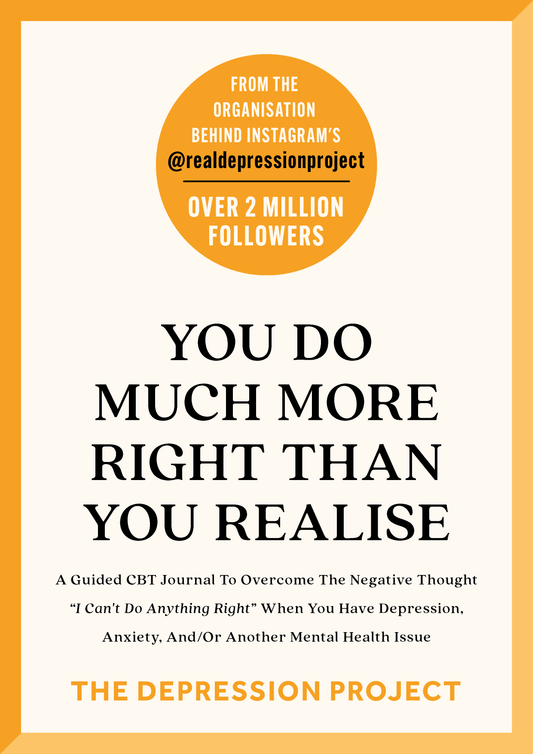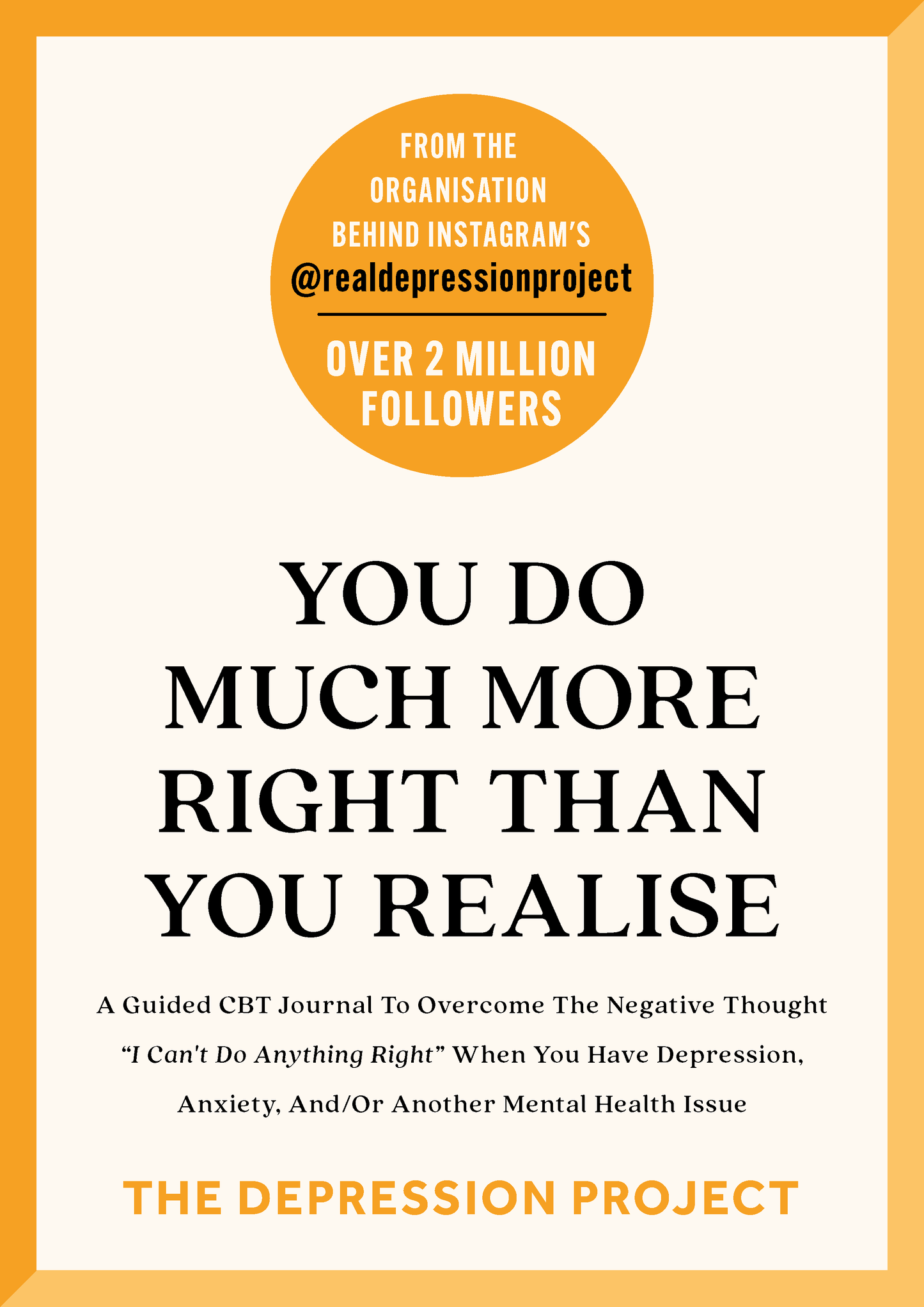
Do you ever experience the negative thought "I can't do anything right"?
According to members of The Depression Project's 3,000,000+ person social media community, the negative thought "I can't do anything right" is often triggered in many different situations - such as when, to quote some of our community members:
- “You’re constantly being criticised by other people.”
- “When you make the slightest little mistake. And I mean the SLIGHTEST. I don’t have any examples right now off the top of my head … probably because I can’t do anything right :(”
- “When you’ve been raised by parents who tell you for years that you can’t do anything right. Their voices ring in your head when mistakes are made.”
- “I think it’s when you believe you are failing at something. When that happens, then your brain starts to think you’re failing at EVERYTHING – even though logically, you know this isn’t true!”
- “Even if I receive constructive criticism, I might take it a little too personally and start putting myself down.”
- “Once I screamed at myself ‘YOU CAN’T DO ANYTHING RIGHT!’ after dropping a pen …”
In saying that, though, the negative thought “I can’t do anything right” is just that – a negative thought – as opposed to a fact. And, for this reason, we’ve put together this cognitive behavioural therapy-based journal, in order to help you:
- See for yourself that this negative thought is not true;
- Start viewing yourself in a much more positive, self-compassionate way.
Here’s A Breakdown Of Exactly What This Journal Will Cover
PART 1: Cognitive Behavioural Therapy Techniques To Help You Overcome The Negative Thought “I Can’t Do Anything Right” Anytime It Is Triggered
In the first part of this journal, we’ll share with you a wide variety of tried, tested, cognitive behavioural therapy techniques to help you overcome the negative thought “I can’t do anything right” anytime it is triggered by one of the factors that we mentioned above (i.e. being criticised, making a mistake, being told by others that you “can’t do anything right”, and/or when you think you’re failing at something, for example).
Additionally, each technique we share with you will also be accompanied by one or more guided journal prompts - in order to help you think about how you could implement that technique as effectively as possible.
PART 2: Additional Suggestions To Help You Cope With Criticism, And Prevent It From Triggering The Negative Thought “I Can’t Do Anything Right”
When we asked our community on social media what can trigger the negative thought “I can’t do anything right”, perhaps the most common response was criticism from other people. And, if you can relate, then in order to free yourself from the negative thought “I can’t do anything right”, it’s important that moving forwards, when you do receive criticism:
- You don’t automatically believe it to be 100% true;
- Regardless of whether the criticism is valid or not, you don’t draw negative conclusions about your character or your capabilities as a result of it.
As promised, the strategies that we share with you in Part 1 will help you do this. However, in addition to these strategies, then like we talk about in Part 2 of this journal, in order to help you better cope with criticism and prevent it from triggering the negative thought “I can’t do anything right”, it can also be very helpful to consider:
- The kind of criticism that is being directed towards you;
- What the intent behind that criticism is;
- What that criticism may say about the person who’s providing it.
After explaining the reasons for this in detail, we’ll then share with you a variety of guided journal prompts - in order to help you evaluate any criticism you receive and what it may say about the person who’s providing it like so, and consequently, help prevent that criticism from causing you to think “I can’t do anything right”.
PART 3: Changing The Way You “Self-Evaluate”
Like we talk about in Part 3 of this journal, as human beings, we tend to have an innate drive to "self-evaluate" – in order to determine if, for example:
- We are doing “well” in life;
- Our life is “on the right track”.
And, for many people, one method they use to self-evaluate is to do so based heavily on the “feedback” they receive from others. In this way:
- If they receive praise, compliments and other positive feedback, then they tend to feel worthy, good about themselves, and have positive thoughts like “I am capable” and “I can do a good job”.
- However, if they receive criticism and other negative feedback, then they tend to feel bad about themselves, unworthy, and have negative thoughts like “I can’t do anything right”.
And, while it is nice to receive positive feedback and while it can often be helpful to receive constructive criticism from well-intentioned people, the problem with self-evaluating based largely on other people’s feedback is that - like we talk about in detail in Part 2 - criticism from other people often says much more about those people than it does about you – which consequently:
- Can make you feel bad about yourself when there’s so much to like about yourself;
- It can make you feel unworthy when you deserve to feel worthy;
- It can make you think “I can’t do anything right” when really, you are much more capable than you are giving yourself credit for.
Consequently, in the third and final part of this journal, we’ll share with you a much healthier method of self-evaluation than doing so based on the feedback you receive from other people - which as we’ll explain, can result in:
- The negative thought "I can’t do anything right" being triggered much, much less frequently than it otherwise would be;
- You feeling much better about yourself moving forwards, as well as more fulfilled and satisfied in your day-to-day life.
FAQ #1: Why should I be confident this journal will help me?
This journal is grounded in cognitive behavioural therapy - which in case you don't know, is a leading form of treatment for depression, anxiety, panic attacks, phobias, personality disorders, and a wide range of other mental health issues.
Additionally, this journal is also written with the warmth, care, encouragement and insight that, with 3,000,000+ followers on social media, The Depression Project has become renowned for :)
FAQ #2: What format does this journal come in?
This journal is available in two different formats for you to choose from:
- PDF - which you will be able to download instantly after purchase, and then print out at your home, office or local printer.
-
Paperback (if you live in the US or Canada) - which will be delivered to you within 4-8 business days. Shipping costs are US$7.95 within the US and CAD$14 within Canada. This shipping cost is a flat rate, so whether you order one journal, or multiple journals, the shipping cost will be the same (if you would like to, you'll find the option to add one or more other journals to your cart below so that you can save on shipping). Once your order has been shipped, you will be emailed a number so that you can track it.
FAQ #3: What if I give this journal a try but I don't like it?
We're extremely, extremely confident that you're going to find this journal immensely helpful. But, just in case you don't, the PDF version of this journal comes with a 60 Day, No-Questions-Asked, 100% Moneyback Guarantee!

If you have any questions about this journal, then please feel free to click here and contact us so that someone from our friendly team can answer them for you :)
Otherwise, we hope you choose to get this journal, because we know that you're going to find it really, really helpful!
All our love,
The Depression Project Team.
Format Options

